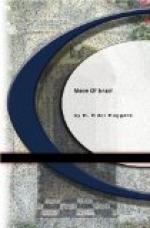“Why does Pharaoh speak thus?” I asked.
“I do not know, Ana, yet that Hebrew wife of mine has been much in my mind of late. She was wise in her way, as wise as loving, was she not, and if we could see her once again, perhaps she would answer the question. But although she seems so near to me, I never can see her, quite. Can you, Ana?”
“No, Pharaoh, though one night old Bakenkhonsu vowed that he perceived her passing before us, and looking at me earnestly as she passed.”
“Ah! Bakenkhonsu. Well, he is wise too, and loved her in his fashion. Also the flesh fades from him, though mayhap he will live to make offerings at both our tombs. Well, Bakenkhonsu is at Tanis, or is it at Thebes, with her Majesty, whom he ever loves to observe, as I do. So he can tell us nothing of what he thought he saw. This chamber is hot, Ana, let us stand without.”
So we passed the curtain, and stood upon the portico, looking at the garden misty with moonlight, and talking of this and that—about the Israelites, I think, who, as we heard, were wandering in the deserts of Sinai. Then of a sudden we grew silent, both of us.
A cloud floated over the face of the moon, leaving the world in darkness. It passed, and I became aware that we were no longer alone. There in front of us was a mat, and on the mat lay a dead child, the royal child named Seti; there by the mat stood a woman with agony in her eyes, looking at the dead child, the Hebrew woman named Moon of Israel.
Seti touched me, and pointed to her, and I pointed to the child. We stood breathless. Then of a sudden, stooping down, Merapi lifted up the child and held it towards its father. But, lo! now no longer was it dead; nay, it laughed and laughed, and seeing him, seemed to throw its arms about his neck, and to kiss him on the lips. Moreover, the agony in the woman’s eyes turned to joy unspeakable, and she became more beautiful than a star. Then, laughing like the child, Merapi turned to Seti, beckoned, and was gone.
“We have seen the dead,” he said to me presently, “and, oh! Ana, the dead still live!”
That night, ere dawn, a cry rang through the palace, waking me from my sleep. This was the cry:
“The good god Pharaoh is no more! The hawk Seti has flown to heaven!”
At the burial of Pharaoh, I laid the halves of the broken cup upon his breast, that he might drink therefrom in the Day of Resurrection.




